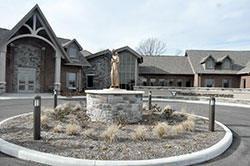Franciscan Alliance opens its first inpatient hospice facility on south side of Indianapolis

A statue of St. Francis of Assisi marks the entrance of Franciscan Hospice House in Indianapolis on Jan. 6. (Photo by Sean Gallagher)
By Sean Gallagher
The day after the Church’s Holy Year of Mercy was inaugurated on Dec. 8, a new effort to show mercy to the dying and their families began when the first patient was admitted to Franciscan Hospice House on the south side of Indianapolis.
It is a ministry of Franciscan St. Francis Health and is located on the network’s Indianapolis campus.
On Jan. 6, Archbishop Joseph W. Tobin praised the mercy that is at the heart of the facility’s mission when he blessed its chapel, celebrated the first Eucharist there, and visited with its staff and some of its patients and their relatives.
“I think [Pope] Francis would really be happy, because in his letter on mercy he says that mercy has to be concrete,” Archbishop Tobin said in closing remarks at the Mass. “It’s not a theory. We have to practice it. And this is a place of mercy. ”
Franciscan Hospice House was made possible through the generosity of many donors who contributed over the past decade to a campaign guided by the Franciscan Alliance Foundation Central Indiana that raised $10.3 million.
The facility features 12 patient suites, a chapel and rooms for the families of patients, including a large kitchen, living rooms and a play room for children and youths.
Franciscan Alliance, a Midwest health care network that includes three hospitals in central Indiana, is a ministry of the Mishawaka, Ind.-based Sisters of St. Francis of Perpetual Adoration.
It has been involved in hospice care for more than a century, but Franciscan Hospice House is its first inpatient hospice facility.
Kristina Basicker, director of the facility, said it can serve hospice patients who do not have caregivers at home that can provide the level of care that they need. The facility can also house hospice patients for five days as a respite for caregivers who are friends or relatives.
Franciscan Hospice House, however, primarily cares for patients near the end of life who need hospital-level care.
“They have symptoms that are out of control and can’t be controlled in the patient’s home environment,” Basicker said. “They might have agitation or seizures or pain that is out of control, nausea or vomiting.”
Although an inpatient hospice facility is new to Franciscan Alliance, Basicker said that it is in harmony with its original mission.
“It certainly meets the mission as far as us being stewards of Christ and giving that type of loving care,” Basicker said. “Our staff, with our chaplains, supports the [patients] and their families. That’s a huge part of what hospice is.”
In his homily during the first Mass in the facility’s chapel, Archbishop Tobin noted that “God will reveal himself in this house.”
“God will reveal himself in the particular care that is given to people who will come here,” he said. “They recognize that they’re not a piece of meat or a motor. They’re a human being made of body, soul, mind and spirit, calling for a pastoral care that recognizes and embraces all of those facets.
“God will reveal himself because preparing for death is often a time for healing of relationships in families and restoring family unity. God will reveal himself to the people who work here, because the dying teach us so much about acceptance, about trust and, finally, hope in the final revelation of God when we meet God face to face.”
After the Mass, Franciscan Sister Marcene Franz, vice president of mission integration for Franciscan St. Francis Health, spoke of the hospice facility and the spirit of St. Francis of Assisi.
“This is what we’re here for, to see babies being born and now [to provide] a place where the terminally ill can be with their families,” said Sister Marcene. “I think this is what St. Francis would want us to do, to be here at the end of life, especially in these days when you hear so much negativity about how we should live and die.” †
